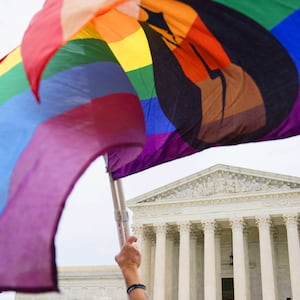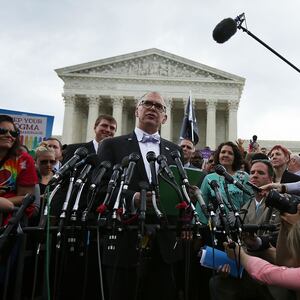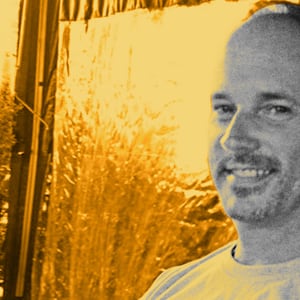“The fight for LGBTQ rights” always sounds grand, and—as grand, sweeping phrases often do—its bravura obscures the grittier, more complex reality. The core of any civil rights movement is brave individuals first realizing, then questioning whatever prejudice has been visited upon them, then rousing themselves to do something about it. Those are very personal and piercing decisions to take.
Then those people may reach out for help, advice, and support; they may ally themselves with others. A case is formed. How far such a case goes depends on luck and a lot of hard, often thankless work by activists, lawyers, and campaigners from organizations like the ACLU, Lambda Legal, the Transgender Law Center, HRC, the National Center for Lesbian Rights, and GLAAD. Support may come from smaller organizations, and local chapters of organizations; from volunteers working and canvassing.
This mostly invisible toil is important to underscore. The population-at-large may only see the results of this work on TV in news bulletins at the end of months and years of work they do not know about. The ticker-tape parades, swelling orchestral music, cheers, applause, and slow-motion rainbow flags flapping in the wind occur as a culmination—and not frequently enough. Do not let colorful Pride parades, and all those LGBTQ characters on TV, lull you: in reality, LGBTQ people, and their rights, are under attack. LGBTQ people need your active support, now urgently.
ADVERTISEMENT
Imagine being an individual who feels they have been discriminated against, coming to that recognition, and then extending that recognition into action. You may not be a natural activist.
You may, like Jim Obergefell whose name is borne on the landmark 2015 Supreme Court ruling that enshrines marriage equality, begin as someone who is simply seeking legal redress over his relationship not being treated equally to a straight person’s. Or Gerald Bostock, Aimee Stephens, and Donald Zarda, who just wanted to get on with doing their jobs—and whose cases were at the heart of this year’s historic Supreme Court anti-discrimination ruling.
Obergefell told me last week that he felt marriage equality was in peril, given the likely appointment of Amy Coney Barrett to the Supreme Court. Right on cue on Monday, as the new term of the Supreme Court began, Justices Thomas and Alito—in declining homophobic Kentucky clerk Kim Davis’ case—opined that Obergefell’s case “threaten[ed] the religious liberty of the many Americans who believe that marriage is a sacred institution between one man and one woman.”
Thomas wrote that the case “enables courts and governments to brand religious adherents who believe that marriage is between one man and one woman as bigots, making their religious liberty concerns that much easier to dismiss.”
Only the court could “fix” this, Thomas wrote, making clear that one of the objectives of a conservative-dominated court would be to overturn marriage equality. Until then the case would have “ruinous consequences for religious liberty.”
Next month, the Supreme Court—possibly, probably, with Barrett appointed—will hear the Fulton v. Philadelphia adoption case. With a conservative majority locked in, the court will almost surely allow taxpayer-funded adoption and foster agencies to turn away same-sex families on the basis of, what else, their “religious freedom” being imperiled if they are prevented from doing so.
This author has written before about “religious freedom” and “religious liberty,” and how conservatives have perverted the definitions of both to attack LGBTQ people; to turn themselves into victims when they are, and always will be, the bully. Thomas’ alarming declaration should clarify the urgency of voting Biden—if you believe in LGBTQ equality, that is; and this must be recognized by not just LGBTQ people, but their allies. Bluntly: Straight folks, it’s time to show up. You are needed.
“Equality” is an important word, and one not used nearly enough by the media and politicians. We hear and read about “LGBTQ rights” or “gay rights”: these can make it sound like that the fight is for some kind of set of special rights. It is not. The “fight” is to get LGBTQ people to an equal starting line, and to stop us from simply being discriminated against. That discrimination happens because we are not equal before the law and therefore vulnerable to having existing laws used against us by those who wish us to remain unequal.
Straight people—informed, very nice straight people—are often surprised by this maddening state of affairs. When the Supreme Court ruled earlier this year that Title VII of the 1964 Civil Rights Act did protect LGBTQ people from discrimination, the reaction of many people was: “Hang on, weren’t LGBTQ people protected already? We thought they were. That’s ridiculous.”
Yes, it is ridiculous. Imagine being LGBTQ, or indeed a member of any minority, and living with this absurdity of having to argue inwardly and outwardly for the very right to live equally to everyone else every day of your life.
Yes, this is absolutely absurd, and believe me: LGBTQ people find having to fight for basic civil rights and protections absurd, but we do it because we have to. We do it because we hope—much as our even braver peers hoped in the years before we were born, in a time of even greater prejudice—to leave the world in slightly better shape for those that come after us.
But it is still an absurd fight. We have to repeat, long after we thought that we shouldn’t need to, that we deserve equality. Like those surprised straight people, we find it amazing that we have to say those words. We find ourselves arguing for our very existence. Over and over again. Straight America needs to realize this, as well as just how much concerted harm is being done to LGBTQ Americans, particularly trans Americans; on November 3, in the voting booth, their “some of my best friends” ally-ship must become active.
Ranged against us are the president and his cabinet, religious fundamentalists, conservative senators and congresspeople, and ever more conservative judges and conservative Supreme Court justices, and conservative columnists keen to stop us getting anywhere near the starting line; who appear to want to legislate us out of existence. What motivates their hatred; a strong word but what else can one call it? They use cloaking words like “faith” and “religious liberty” when really they just despise LGBTQ people.
The real mystery: What do they hate so much, and what nourishes this hate? Probably the “unnatural” sex they imagine LGBTQ people having. The fact they are “different” to whatever was rapped into their heads as kids.
The effects and ripples of this relentless othering, hatred and discrimination is horrific and utterly un-Christian: LGBTQ teens suffering from depression, LGBTQ people attempting suicide, and acts of violence being committed against LGBTQ people, particularly Black trans women. The fight against LGBTQ equality doesn’t occur in a vacuum; it doesn’t end with celebrating Amy Coney Barrett’s likely appointment as a victory for conservatives; it means more misery, more utterly needless misery, for large numbers of people.
If you consider yourself any kind of Christian, think about what you are celebrating and fighting for. If your “conservatism” means something beyond owning the libs, think specifically about what your politics are doing to the very real lives of others. Imagine it was you, as a straight conservative, who had to fight for the most basic civil rights under the law for the last half-century and more. Your faith and conservative politics—that bible you are holding—mean nothing if they extend to simply hurting other people.
Of course, the fight against LGBTQ equality isn’t really about faith; it is about power—and the whipping up of cultural wars and the exploitation of faith as a way of crowd-sourcing bigotry in the quest for votes. LGBTQ people and equality are just collateral damage for President Trump. Mike Pence, in contrast, wholeheartedly believes in the judgmental ugliness he pursues.
The war the Republican Party has waged against LGBTQ people from the Reagan era onwards has led to so much needless harm and cultural regression. It is sick. If Trump and Pence were capable of feeling shame, they would be drowning in it. But no; the culture war must simply be ramped up. And so, LGBTQ people, used to all this nonsense for so many years, find themselves yet again on a battlefield they never asked to be on but are wearily familiar with.
The lawyers and campaigners will fight at the Supreme and lower courts because they are passionately engaged in the battle for equal rights and justice. But, as with so many wars LGBTQ people have fought in, this is also a fight against a pointless viciousness. Bigotry is an insulting waste of everyone’s time, yet it must be confronted and beaten. The Mattachine activists knew and felt that in their bones. The Stonewall rioters knew and felt the same. So do we. Right now, and most importantly on November 3, LGBTQ people need the rest of America to know and feel it too.








